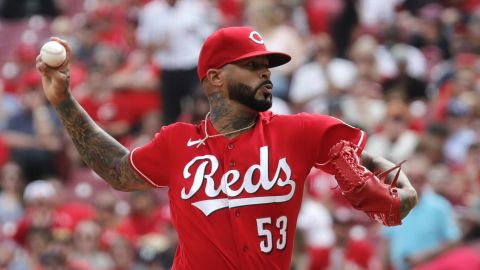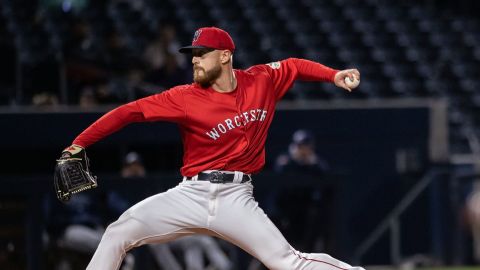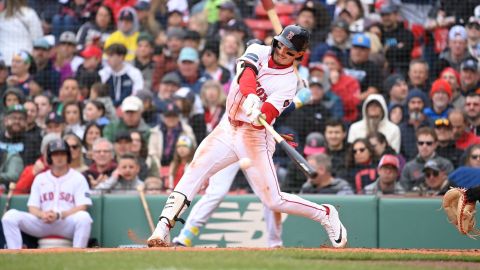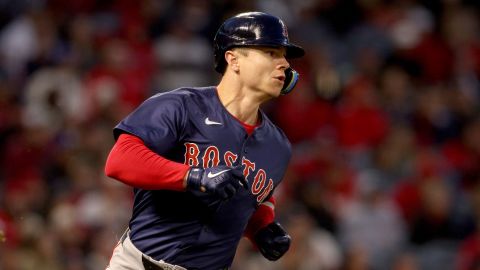More often than not, you don't need stats to tell you what's already plain to see on the playing field.
Kevin Youkilis can get on base. David Ortiz can drive the ball. Jonathan Papelbon can bring the heat.
OK, we get it. We watch the games. We know these things.
But sometimes, the stats can throw you a curveball. Case in point: Who knew that Jacoby Ellsbury wasn't one of the American League's elite defensive center fielders?
To anyone who watched the Red Sox closely this season, that statement sounds like blasphemy. Ellsbury captivated Sox fans all year long with his exceptional range and dazzling highlight-reel catches in center field. If anything, we thought, Ellsbury was one of the strong points of the Red Sox' defense this season, not one of the weaker ones.
But the numbers don't lie. The statistic in question is "Ultimate Zone Rating," or UZR, and it's a fairly simple concept. The baseball field is divided up into "zones," and each fielder is responsible for covering a different portion of the field. When a ball is hit into his zone, a fielder is rated on his ability to show his range, avoid making errors, use his arm, and turn double plays if necessary. His performance is then translated into a number — runs. A player with a positive UZR is preventing runs better than the average fielder, while a negative one means the fielder is giving runs away.
According to UZR, the Mariners' Franklin Gutierrez, the Rays' B.J. Upton and the Brewers' Mike Cameron are the game's best center fielders. Because of their superior range, efficiency and decent throwing abilities, they are far, far above average.
On the other end of the spectrum, there's Ellsbury.
The stat sheet shows that the Red Sox center fielder is second to last among regular major league center fielders, leading only the Blue Jays' Vernon Wells, who has had a disastrous downswing over the past couple of years. The numbers reflect Ellsbury's weak arm and deceptively narrow range. According to Michael Silverman in Sunday's Boston Herald, Ellsbury needs to improve at "reading the flight of balls when he comes in or goes back."
It's a good point. Ellsbury's strength is cutting off balls hit into the gaps. If you hit the ball to left-center or right-center, not too shallow and not too deep, Ellsbury will use his blazing speed to get over to his side and make an impressive catch. But if you only pay attention to the gappers that Ellsbury fields, you're missing the bigger picture. Where Ellsbury can improve are with his instincts and that will come over time. For example, immediately when the ball's hit, Ellsbury needs to improve reading how hard the ball was hit and how deep he needs to be.
The numbers really are telling the truth. Ellsbury is nowhere near the center fielder that we all expected. In fact, Silverman reports that "while [the Red Sox] see Ellsbury maturing into an excellent center fielder, they also have mulled moving him to left field, where they believe he would be outstanding." Because left field is a narrower part of the outfield, especially in Fenway Park in front of the shallow Green Monster, it would be a position much better suited to Ellsbury's abilities.
Sound argument. But there are two holes.
First, there's the scarcity problem based on the simple economic laws of supply and demand. With Jason Bay headed for free agency this winter, the Red Sox are likely to be short one outfielder. They can either sign Bay (or another comparable left fielder), or they can move Ellsbury to left field and sign someone to play center. Which would be easier?
It's been well publicized that corner outfielders are going to be a dime a dozen this winter. And that's usually the case — you show me an outfielder that can hit, and I'll show you a guy you can easily stick in left field or right interchangeably. But solid center fielders are hard to come by — it's one of the premier defensive positions in the game. The Sox don't want to corner themselves into overpaying for Ellsbury's replacement. Demand is high and supply is low on the center-field market.
The second problem? Ellsbury's too good to give up on now. So far, his results as a center fielder have been discouraging — but he obviously has potential. He's an athlete blessed with extraordinary speed, and he has good agility and good hands to boot. His instincts as a center fielder may leave plenty to be desired, but he can develop those with time. You can't teach speed — but you can, in fact, teach the fundamentals of the game. So why not try teaching Ellsbury?
Jacoby Ellsbury is a superb athlete — there are no stats butting in to tell us otherwise. As for defense, though, he's a work in progress and the Red Sox shouldn't give up on that work just yet.



